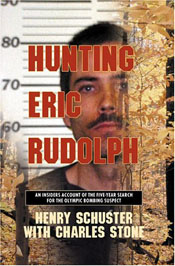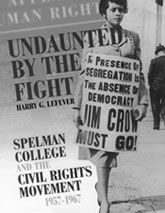Alumni Ink
 The five-year manhunt for Eric Robert Rudolph, the elusive suspect in the bombings of Centennial Olympic Park in Atlanta, a gay nightclub, and two clinics that performed abortions, is captured in The Hunt for Eric Rudolph (Berkley Publishing Group, 2005). The authors—Henry Schuster ’78C, senior producer for CNN’s investigative unit, and Charles Stone, head of the Georgia Bureau of Investigations Anti-Terrorist Task Force and the lead investigator on the Rudolph case—detail secret surveillance methods used to track Rudolph in the North Carolina mountains and lend insight into the fugitive’s home life. Rudolph, who was on the FBI’s most wanted list, was arrested in May 2003 in Murphy, North Carolina. The five-year manhunt for Eric Robert Rudolph, the elusive suspect in the bombings of Centennial Olympic Park in Atlanta, a gay nightclub, and two clinics that performed abortions, is captured in The Hunt for Eric Rudolph (Berkley Publishing Group, 2005). The authors—Henry Schuster ’78C, senior producer for CNN’s investigative unit, and Charles Stone, head of the Georgia Bureau of Investigations Anti-Terrorist Task Force and the lead investigator on the Rudolph case—detail secret surveillance methods used to track Rudolph in the North Carolina mountains and lend insight into the fugitive’s home life. Rudolph, who was on the FBI’s most wanted list, was arrested in May 2003 in Murphy, North Carolina.
Jonathan Schanzer ’94C is the author of Al-Qaeda’s Armies: Middle East Affiliate Groups and the Next Generation of Terror (Washington Institute for Near East Policy, 2004). Schanzer asserts that Al-Qaeda still threatens the West despite the fact that thousands of its fighters have been killed or captured. Using never-before published material, Arabic language sources, and personal interviews from the Middle East, Schanzer examines “affiliate groups” in Egypt, Lebanon, Algeria, Yemen, and Iraq, and shares research from a fact-finding mission in Iraq, where he interviewed al-Qaeda fighters and one of Saddam Hussein’s former intelligence officers.

Richard H. F. Lindemann ’88G is the author of The Dr. Seuss Catalog: An Annotated Guide to Works by Theodor Geisel in All Media, Writings About Him, and Appearances of Characters and Places in the Books, Stories, and Films (McFarland and Company, 2005). Geisel produced a body of work that spans more than seventy years. Though most often associated with children’s books, he frequently contributed cartoons and humorous essays to popular magazines, produced effective and memorable advertising campaigns, and won Oscars and Emmys for motion picture productions, animated shorts, and features. Lindemann is director of the George J. Mitchell Department of Special Collections and Archives at Bowdoin College Library in Brunswick, Maine.
In All According to God’s Plan: Southern Baptist Missions and Race, 1945-1970 (University Press of Kentucky, 2004), Alan Scot Willis ’90C-’90G shows how, in the post-World War II era, respected members of the Southern Baptist Convention publicly challenged the most dearly held ideologies of the white South. Believing that racism hindered their evangelical efforts, the convention’s full-time missionaries and mission board leaders attacked racism as unchristian, thus finding themselves at odds with the pervasive racist and segregationist ideologies that dominated the South. Willis is assistant professor of history at Northern Michigan University.
 Undaunted by the Fight: Spelman College and the Civil Rights Movement, 1957-1967 (Mercer University Press, 2005) by Harry G. Lefever ’71PhD is a study of a small but dedicated group of Spelman College students and faculty who, between 1957 and 1967, risked their lives, compromised their grades, and jeopardized their careers to make Atlanta and the South a more just and open society. Lefever, professor emeritus of sociology at Spelman, argues that the participation of Spelman’s students and faculty in the Civil Rights Movement represented both a continuity and a break with the institution’s earlier history. Undaunted by the Fight: Spelman College and the Civil Rights Movement, 1957-1967 (Mercer University Press, 2005) by Harry G. Lefever ’71PhD is a study of a small but dedicated group of Spelman College students and faculty who, between 1957 and 1967, risked their lives, compromised their grades, and jeopardized their careers to make Atlanta and the South a more just and open society. Lefever, professor emeritus of sociology at Spelman, argues that the participation of Spelman’s students and faculty in the Civil Rights Movement represented both a continuity and a break with the institution’s earlier history.
Spurred first by the civil rights debates of the 1960s and ’70s, and then by the culture wars of the following decades, the Chicago Historical Society (CHS) increasingly sought to give visitors and patrons a voice in retelling the city’s history. Catherine M. Lewis ’90C conducted more than 250 interviews with staff at the CHS and museums around the country for her book The Changing Face of Public History: The Chicago Historical Society and the Transformation of an American Museum (Northern Illinois University Press, 2005). The book offers a behind-the-scenes look at the ways in which one of the most innovative museums in the United States has continually grappled with issues confronting not only museum professionals but all those concerned about the role history plays in the lives of American citizens.
Christopher Darnell Smith ’00C is the author of Land of the Lullaby (Seemann Press, 2003), “a delightful and instructive tale” according to Peter W. Dowell, professor of English and senior associate dean, in which “youngsters will easily identify with the trio of insect-heroes and enjoy their adventure along the Peek-A-Boo Trail. Their story offers valuable insights about teamwork, strengths, and talents that compensate for disabilities, and respect for others who are different.”
In Carl Vinson: Patriarch of the Armed Forces (Mercer University Press, 2004), James F. Cook ’62C portrays the Georgia congressman as an astute and crafty politician who was the principal architect of the nation’s modern defense system. The “Georgia Swamp Fox,” as Vinson was known, served in the House of Representatives for a half century and was chairman of the Naval Affairs/Armed Services Committee. Cook is professor of history emeritus at Floyd College.
Steven C. Hahn ’99PhD, assistant professor of American history at St. Olaf College, has written The Invention of the Creek Nation, 1670 to 1763 (University of Nebraska Press, 2004.) The book draws on archeological evidence and rare Spanish source materials to explore the history of the Creek Indians of Georgia and Alabama and their kinship-based political system. The book, which began as Hahn’s doctoral thesis at Emory, has taught him “the agony and the ecstasy of writing history.”
Jeffrey S. Reznick ’99PhD, executive director of the Orthotic and Prosthetic Assistance Fund, has written Healing the Nation: Soldiers and the Culture of Caregiving in Britain during the Great War (Manchester University Press, 2004), which explores life behind the lines for ordinary British soldiers who served on the Western front. Revealing aspects of wartime life that have received little attention, Reznick shows that Britain’s “generation of 1914” was a group bound as much by a comradeship of healing as by a comradeship of the trenches. |
|